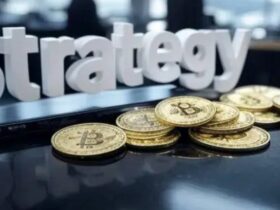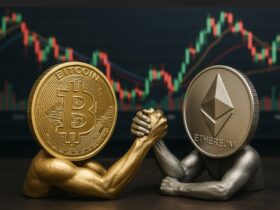Although the Venezuelan banking system may be linked to cryptocurrency operations in peer-to-peer (P2P) markets, due to its transactional nature, it is lagging behind in terms of the management or direct marketing of digital assets.
Colombia, with Bancolombia, or Spain with Santander, among other countries, already have platforms that allow their users to trade with bitcoin (BTC), stablecoins or other digital assets. History in the case of Venezuela has yet to be written.
For Richard Ujueta, president of the Venezuelan Chamber of Electronic Commerce (Cavecom-e), The banking sector is missing a business opportunity.
However, the executive believes that it is a matter of time before these types of services begin to be offered in the “vinotinto” country.
“Banks in Venezuela already have to sell cryptocurrencies, it is a sector that has great momentum throughout the world. They (banks) are being left out of service and we see from Cavecom-e that the flow of capital is going that way,” said Ujueta in an interview with CriptoNoticias.
For the manager, National banking is already connected with companies in the “crypto” ecosystem. An example of this progress is the alliance established in February with the company Crixto, which led to new alternatives for payment in commercial establishments.


However, there is still a long way to go since to get banks in Venezuela to sell and buy digital assets, rules and regulations must be established. This goes beyond the provisions already established from the announcement, in 2017, of the petro (PTR), a project revealed by Nicolás Maduro.
“There has to come a norm of coexistence and collaboration like the United States had to do with banking for fiat-crypto operations and vice versa. We as a union ask for an interconnected system since it seems to us that it is something natural, it is something that is evolving in the world,” added Ujueta.
What our interviewee comments could begin to come true sooner rather than later. Rodolfo Gasparri, president of Conexus and one of the developers of the Mobile Payment system, recently reported that they are already working on an interbank network based on blockchain.
Adoption of cryptocurrencies in Venezuela, a book in progress
In a report from the blockchain research firm, Chainalysis, it is revealed that Venezuela ranks 18th in the global adoption of cryptocurrencies, which speaks of the usability that society gives to digital assets. This also includes business adoption, which Ujueta calls an “important” aspect.


“Within the union, the acceptance of digital assets has been important. The large business conglomerate is involved with cryptocurrencies. This has not happened since now. What happens is that businessmen always had doubts, but they have already seen their benefits and are calmer.”
Regarding the type of companies that are adopting cryptocurrencies, the president of Cavecom-e explains that the profile is small and medium-sized. According to their figures, 25% of the population already uses or protects cryptocurrencieswhich would represent about 7 million users.
“Currently there are more than 60 regulations that talk about crypto assets in Venezuela. Unfortunately we had bad experiences in the past, but at any time there may be announcements of new operators authorized in the country,” explained Ujueta.
The statement refers to the fact that in Venezuela there are currently two operators authorized to trade digital assets: the aforementioned Crixto and the Kontigo platform. According to the manager New companies could soon be approved in this field.
“The speed with which these operators’ accounts are being opened is impressive. There is a high participation every week, which has been growing significantly.”
USDT adoption and a possible Venezuelan stablecoin
In Venezuela, the approach to cryptocurrencies goes along two tracks: the first has been due to the needs of users to counteract the effects of high inflation, the shortage of dollars and the devaluation of the bolivar, the national currency.
The second has been the national government itself, which tried at the time to promote the use of the petro as a digital asset of the State, but not with the expected results.
Now that there is talk on a global scale about stablecoins, that the use of USDT has grown in the oil country and that Maduro himself stated in August 2024 that the nation would return to the path of cryptocurrencies, It would not be unreasonable for a new national digital asset proposal to emergesomething closer to some type of Central Bank Digital Currency (CBDC) or dollar stablecoin. On this point Ujueta highlighted:
“For me that could be an interesting route, but not as a digital currency tied to the United States dollar, it could be based on raw materials that were already linked to the petro at some point. However, unfortunately we already know what happened to the petro.”
The union member believes that Venezuela has to move towards this modality, although he doubts whether it should be by reviving the petro or by creating a digital asset again from scratch.
Another of his proposals is that Venezuela should look closely at the tokenization processes that are developing in the world and mentions that Venezuelan gold could be considered for potential digitalization of local reserves. The same consideration arises for real estate.
“Venezuela can enter the tokenization of gold and real estate. Pilot plans could be implemented and advance little by little. We already see it in Spain and the United States, that is already a movement on a global scale,” he said.
Regarding the rise of USDT in retail purchases by Venezuelans, he views the situation favorably and believes that these transactions could grow a lot. Now in relation to the management of the main stablecoin in the market by the Central Bank of Venezuela (BCV), the manager believes that it is illogical for the country to have reserves in USDT.
“It is one thing that downstream settlements are made in USDT and another thing is that Venezuela has reserves of USDT. You have to be very naive to say that Venezuela has reserves of that type. Venezuela will be managing other types of assets that are much safer, much more controlled.”






Leave a Reply